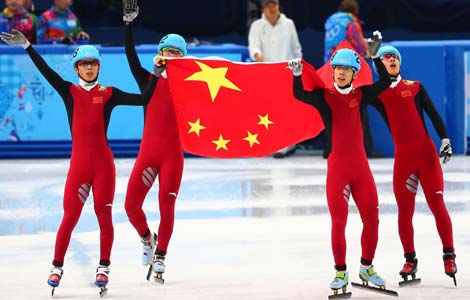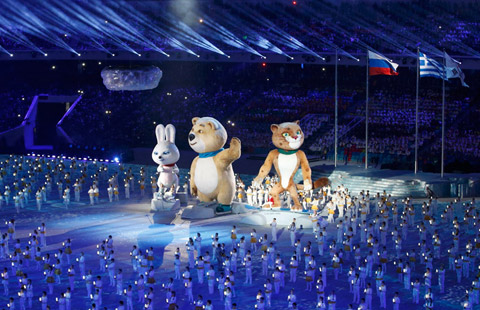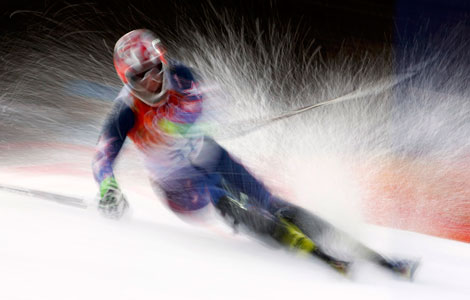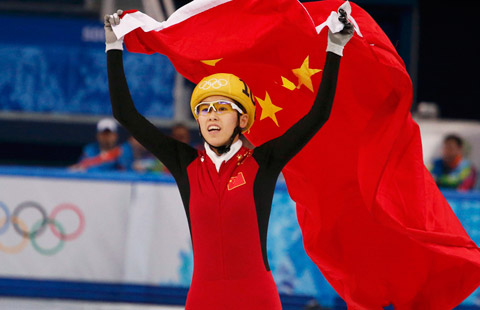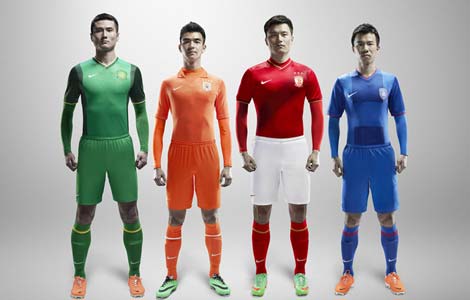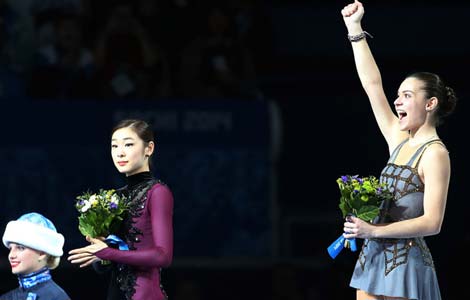


Nation to continue looking abroad in pursuit of Winter Games glory
Ten foreign coaches worked with the Chinese delegation at the Sochi Winter Olympics Games and that trend is unlikely to change.
In the wake of the country's three gold medals, four silver and two bronze, senior sports officials said the nation would stick with the policy of inviting foreign coaches and sending athletes abroad to train.
"Inviting foreign coaches is a very common thing in sports right now and China always applies the policy of 'training abroad and inviting foreigners to help'," said Xiao Tian, deputy chef de mission of the Chinese delegation.
"The integration into the world's sports family is a natural trend. China will invite more high-level foreign coaches to help in the future."
The number of medals gained by China in Sochi was less than it collected at the Vancouver Winter Games four years ago, where the summer sports powerhouse won five gold medals, two silver and four bronze.
But the Sochi Games saw a rise in the overall strength of China in winter sports and some major breakthroughs: the country won its first gold medal in speed skating when Zhang Hong claimed the women's 1,000m; the men's curling team made history by finishing fourth; and young skier Ning Qin was the first Chinese athlete to compete in the women's freestyle moguls, where she reached the final and finished 18th.
Canadian coach Marcel Rocque was the hero in curling.

As the head coach of both the women's and men's teams, Rocque, who had only been working with the squads for eight months, helped the women grab an Olympic ticket at the last moment and lifted their male counterparts to the top four in the world.
"The foreign coach helped me to improve a lot," said Wang Bingyu, skip of Chinese women's team.
"Although curling originated in Scotland, it is very popular in Canada and the coach knows the concepts of playing curling well. He brought passion and new things to us," Wang said.
The 42-year-old Rocque, who has three world titles to his credit as a player, signed a 10-month contract with the Chinese team in July 2013.
He said he is happy with what he has achieved during his time in China.
"I believe in giving to the sport that I love and I have always given to the sport in Canada. But, I think our sport has to be healthy everywhere. So, China is a great country that tries to help the game of curling throughout the world," Rocque told China Daily.
"(Working with the Chinese team) has been fantastic. They have been so caring, so gentle. They included me as part of a big family. So it is very, very nice to work with them."
Other foreign coaches helped out in the snow events where China is a relative newcomer.
Murray Cluff, coach of women's moguls skier Ning is one of them.
"When I first started working with them (the Chinese) in July 2012, they said that they wanted to win in Sochi. I explained to them that the best I can do is to get her (Ning) to qualify for Sochi. You need seven to 12 years to be able to win," said Cluff, .who won the freestyle world title in 1980 and represented Canada in the sport for 12 years.
After retiring, Cluff coached to Jennifer Heil, who claimed moguls gold at Torino 2006 and silver at Vancouver 2010.
"In 2006 there was so much expectation to win and there was intense pressure. Now there is the satisfaction that someone has progressed and qualified for the Olympics. For me that was exciting," Cluff said.
For Ning, the language barrier was not a problem.
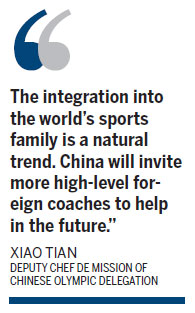
"The biggest help Cluff gave me in the past two years is a new understanding of the sport," said the 22-year-old. "Moguls originated in North America and he told me to improve my skills in skiing and jumping together, which was very useful in my progress."
According to statistics from the Chinese delegation, among the nine medals China gained in Sochi, six were pocketed by young athletes who were participating at the Winter Olympics for the first time. Also, 13 young athletes finished in the top eight of their respective events.
"The young athletes showed their energy at the Games and withstood the tests here," said Xiao. "They will be the backbone of our country's efforts to win medals on the world stage in the future."
However, Xiao conceded a gap still remained between China and the winter sports powerhouses.
"It was a difficult Olympics for China," said Xiao. "There were 12 new events included at the Games and we had no advantages (in them). Our gold favorite, short track speed skater Wang Meng, was injured before the Olympics. But we remain the best in Asia.
"It was a historic moment when Zhang ended China's Olympic gold drought in speed skating, a blue-ribbon event in winter sports. It was the most impressive gold medal for the country.
"However, we also missed some good chances in the competition and we will endeavor to improve."
The Sochi Winter Olympic Games concluded on Sunday night in the coastal city. The next Winter Games will be held in Pyeongchang, South Korea, in 2018.
Beijing and neighboring Zhangjiakou are bidding for the 2022 Winter Olympics. A shortlist of three candidates will be announced in July and the final vote will be held in July 2015.
leilei@chinadaily.com.cn
